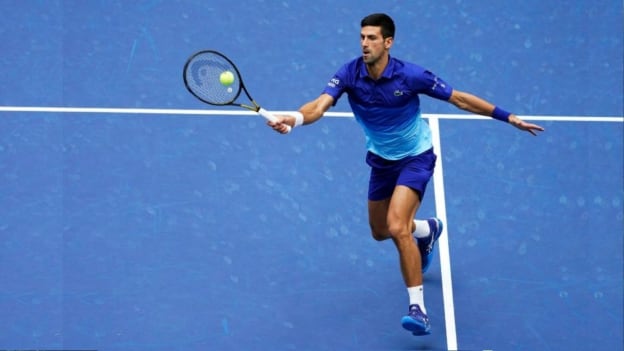What if your star employee behaved like Djokovic?

There’s only one Novak Djokovic; in the world of tennis, he’s as good as irreplaceable. And it’s this star power that has kept him in the headlines for the last month, as he ran afoul of Australia’s vaccination rules just before the Australian Open - the first of the year’s four international Grand Slam tennis tournaments.
What was the actual issue?
Simply put, Djokovic didn’t want to take the COVID-19 vaccine. He’s been open about his views, saying as early as April 2020 - well before the vaccine was developed - that he is opposed to vaccination and wouldn’t want to be forced to take a vaccine in order to travel. However, Australian tennis governing body Tennis Australia laid down a rule last November that everyone who wants to participate in the tournament must be vaccinated. Djokovic then applied for a medical exemption to this rule after testing positive for the virus in December. He received it, to public outcry in Australia - with many suspecting that his celebrity status had somehow played a role in Tennis Australia’s decision.
The back-and-forth drama
When Djokovic arrived in Australia, he was detained by border authorities and his visa cancelled, with the government stating that his medical exemption is not considered valid. The court subsequently overturned the visa cancellation - but said that the government could still deport Djokovic, a decision that seems increasingly likely, now that Australian authorities suspect him of making false declarations about his travel prior to arriving in the country.
What if this happened in a workplace context?
Every organisation has its own star employees, or at least preferred employees: the people who come up with the best-selling products and services, the people who bring in the clients and the revenue. It’s easy to see how managers might choose to give such a star performer some leeway even for policies that appear otherwise non-negotiable. And it does happen, albeit for lower-stakes policies than vaccination. For instance, a top performer might be allowed extra flexibility around set working hours or dress codes, or might be granted additional leeway with the use of benefits. It’s a valid managerial decision, just as Tennis Australia’s decision to offer a medical exemption would have been.
Problems emerge, however, when such leeway clashes with high-stakes standing policies. The problems only become worse if there is miscommunication about the policy at higher levels - if two different authorities say different things. For instance, back in November Australian Health Minister Greg Hunt had apparently sent a letter to both the Australian Open organisers and Tennis Australia stating that a COVID-19 infection alone, without full vaccination, doesn’t qualify someone for a quarantine exemption. But the Ministry of Home Affairs subsequently cleared Djokovic for quarantine-free arrival. And Hunt’s letter then resurfaced last week, in the middle of the controversy about Djokovic’s visa cancellation.
What’s a manager to do if one leader says yes and the other says no? Ideally, this would be recognised as not actually the manager’s fault. A decision has to be taken at some point, and there’s no doubt that celebrity status, or at least high-performer status, may sway that decision in the direction of ‘yes’. Unfortunately, for a high-stakes decision like that of Novak Djokovic’s visa, blame will eventually land somewhere - hence the rush of parties trying to clear themselves of wrongdoing over the last week.
On the other hand, there’s also the fact that Djokovic himself has been highly vocal about his views on vaccination and also has a history of not taking health and safety precautions seriously. There’s also the issue of his possibly having made false travel declarations in order to obtain his visa.
In a workplace context, where people are expected to cooperate and collaborate - and indeed companies have spent the last two years sweating over the very question of how to improve collaboration - this would never fly. Even top leaders have been sacked for not following COVID-19 health and safety policies. Top performers aren’t likely to be spared.
How should organisations and leaders or managers handle something like this?
People Matters ran the question by Rahul Chawla, Head of Human Capital Solutions, Southeast Asia at Aon, who pointed out that it is, after all, a fundamental requirement of one’s job to cooperate with the controls, policies, and processes that are meant to protect stakeholder value. And the very definition of ‘star employees’ also hinges on doing that - it’s not just about the numbers they bring in.
“'Star' employees as in Djokovic's case would be identified as such via the performance management system of a company which would not just focus on 'trophy' winning outcomes but also ideally would include risk, compliance and behavioural measures,” he said.
“Organisational values and culture are the intangibles which also act as beacons for employees to be in alignment.”
The idea behind granting exceptions, he added, is that such exceptions would not expose the organisation and its stakeholders - be they customers, employees, shareholders, or others - to immediate or long-term risks. And ideally, an organisation would have processes in place to properly deal with such issues when they do happen.
It’s best to nip these things in the bud, too, and a good approach is to be more employee-oriented and inclusive in the policy-making process. “How companies can proactively avoid such cases is by involving employees and high performers in co-creating certain policies covering employee benefits, working models etc., which are not governed by regulatory frameworks,” Chawla advises.
The outcome of the dispute between Novak Djokovic and the Australian government may well be his deportation. What outcome should companies work toward in a similar situation? Write in and let us know.
Image: Novak Djokovic at the US Open 2021, from https://novakdjokovic.com/















